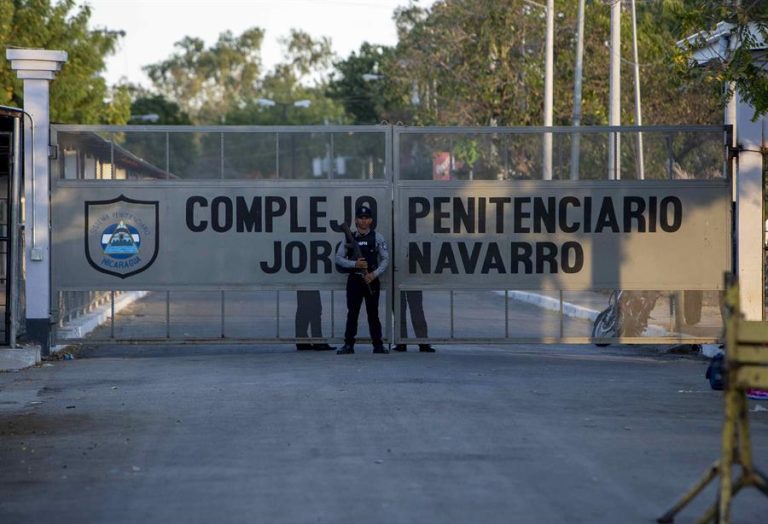15 de febrero 2023

Children of Exile: The Births “Sowing Hope” in the Camp of Nicaraguan Farmers

PUBLICIDAD 1M
PUBLICIDAD 4D
PUBLICIDAD 5D
The relatives called on the 222 released and exiled persons to continue the struggle so that “not a single political prisoner remains in Nicaragua”

Yaritzha Mairena urges opposition forces to “unify a strategy” to free the remaining political prisoners and work towards “access to justice.”
The relatives of 35 political prisoners —including ten citizens detained before the 2018 civic rebellion— who were not released by the Ortega regime along with the 222 exiled on February 9, asked the international community and human rights organizations for their support to achieve their release. The relatives made their request in a statement read at a press conference on Tuesday, February 14.
According to family members, the political prisoners remain in degrading conditions in different penitentiary systems in Nicaragua and they have suffered torture.
The relatives acknowledged they are afraid of possible reprisals against them, although they assured that they cannot remain silent in the face of the injustice their relatives are living.
At the same time, they called on the 222 former political prisoners to continue fighting so that in “Nicaragua not a single political prisoner remains.” They called on the countries “friends of justice, democracy and freedom” to pronounce themselves “in favor of receiving our relatives”. Likewise, they ask the rest of the civil society organizations to join their fight for freedom.
Dictator Daniel Ortega assured last Thursday that Bishop Rolando Álvarez —sentenced to 26 years in prison— and the political prisoner Fanor Alejandro Ramos did not agree to leave the country, together with the 222 exiles. While the rest of the prisoners of conscience were not released because they were convicted of common crimes.
The relatives assured that Ortega told “a series of lies and false testimonies” about their relatives, since their names “were on the official lists of political prisoners and were not taken into account for their release.”
On the contrary, they included former officials of the Judiciary and historical Sandinistas, who were imprisoned for common crimes, clearly contradicting the supposed justification for keeping their relatives imprisoned.
On the list of those released, the regime included the historical Sandinista Marlon Gerardo Saenz Cruz, known as Chino Enoc and convicted of the crimes of illegal transport of drugs, manufacturing, trafficking and illegal possession of restricted weapons; Maria Jose Camacho Chevez, Hans Camacho Chevez and Roberto Emiliano Larios Meléndez, former employees of the Judiciary; and Humberto Alejandro Perez Largaespada, former Sandinista mayor of Jalapa.
The relatives denounced that they “were not political prisoners” because “they were part of the repressive apparatus that Nicaraguan citizens have experienced, at the hands of militants of the Sandinista Front.”
In the case of Perez Largaespada, they noted he has been accused by opposition citizens of death threats and being the head of paramilitaries in the municipality of Jalapa.
The 35 political prisoners are originally from Matagalpa, Managua, Masaya, Esteli, Leon and the South Caribbean, and are detained in the prisons of those Nicaraguan departments and regions.
The relatives detailed that the detainees suffer constant ill-treatment and torture, among them:
Until now, none of the relatives has been able to speak with their relatives in the prisons to find out what their current situation is.
The Mechanism for the Recognition of Political Prisoners recalled that ten prisoners of conscience were imprisoned for political reasons before 2018. One of the best-known cases is that of ex-combatant Marvin Vargas, arrested in 2011 after organizing protests against Ortega.
According to his relatives, Vargas will have served 12 years in prison next May, despite the fact that there are several release orders.
The other nine people were allegedly responsible for the “July 19 Massacre”, as an armed attack against a caravan of supporters of the Sandinista Front became known in 2014. The case was questioned by legal experts due to judicial irregularities.
The relatives and the Mechanism assure that starting this February 14th they begin a permanent campaign for the release of the 35 political prisoners, under the label “Nosfaltan35”.
This article was originally published in Spanish in Confidencial and translated by Havana Times
PUBLICIDAD 3M
Confidencial es un diario digital nicaragüense, de formato multimedia, fundado por Carlos F. Chamorro en junio de 1996. Inició como un semanario impreso y hoy es un medio de referencia regional con información, análisis, entrevistas, perfiles, reportajes e investigaciones sobre Nicaragua, informando desde el exilio por la persecución política de la dictadura de Daniel Ortega y Rosario Murillo.
PUBLICIDAD 3D